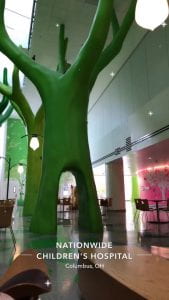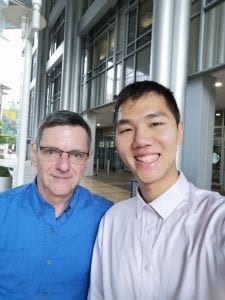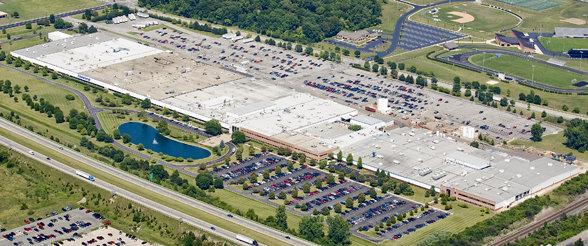For my STEP Signature Project, I completed an internship as a part of the Washington Academic Internship Program (WAIP) through the John Glenn College of Public Affairs. Through WAIP, I was a communications intern at the Peace Corps where I was primarily responsibility for curating, writing, and editing blog content for the ‘Stories’ section of the website. I also got to experience many professional development workshops, as well as study tours, policy salons, and service projects.
My experience is Washington, D.C. drastically transformed my understanding of myself. First, it was my first internship experience, and second, it was the first time I had ever lived away from home (aside from college, but then again, I am from Columbus!) for an extended amount of time. Getting the chance to live on Capitol Hill while completing my internship at Peace Corps really expanded my world-view. The national news that I would read on my Twitter feed was suddenly occurring right around the corner from where I lived! To be able to walk to places like the Supreme Court, the Capitol and the Washington Monument on a daily basis was a very surreal experience. It was also interesting to be surrounded by 29 other students who were equally driven and passionate about policy and social issues. This created a highly motivated atmosphere, and influenced me to learn, do, and see as much as I could while I was there.
WAIP was incredible, but there were definitely moments where exhaustion would catch up to me! I learned a lot about my ability to have fortitude and preserve, even when I was physically tied. I knew in the long run that this experience would carry me a long way after I left, so I continued to give it my best foot forward.
My internship had a big role to play in my personal transformation. I had never thought about how intricate a communications team is in an organization, but having that experience exposed me to all the moving parts there are to it. I personally worked with the digital/social team, but I got to learn a lot about press relations, graphic design, web design, marketing, external communications, congressional relations, and so much more. One of the coolest things I got to do with the Peace Corps was participate in a flyer drop for a recruiting event they had for Capitol Hill interns or “Hillterns.” I got to drop flyers in each congressional office, and later had the opportunity to attend the event myself. I heard Peace Corps experiences from U.S. Reps. Donna Shalala and Joe Kennedy, which even further prompted me to consider applying for the Peace Corps after I graduate.
I worked on several blog series while at Peace Corps, but one of my favorites was “Why I Joined.” I got to read and edit a blog about a Peace Corps Volunteer (PCV) in Tanzania who joined to reconnect with her East African roots, as her mother was a former PCV who had met her father during her service.
Outside of my internship, WAIP gave me some incredible moments. One of them was a service trip the cohort took to the Kenilworth Aquatic Park. I ranked this experience as one of my favorites because it was really nice to be able to get away from the busy D.C. life and help create something really beautiful. Another great moment was when I got the chance to visit the Indian Embassy to learn about the History of Bollywood Cinema. This workshop was taught by the ambassador’s wife, whose passion for the topic was engaging and very pleasant to listen to. We were also provided an authentic Indian dinner and it was delicious!
I had some great opportunities to network. I met up with several young OSU alumni who also underwent WAIP. It was great talking to them because they also have similar interest as me being former communications/ journalism majors. Seeing where they’re majors led them and the career trajectories, they’re on now gave me a lot of hope and excitement for the possibilities of my own future.
My STEP signature project was valuable for me in several different ways. I definitely think I accomplished the goal of learning more about potential career paths following graduation. Specifically, interning at the Peace Corps expanded my understanding of the world. I learned about the gravity of social injustices all over the world, and thus my interest in international relations and grassroot development work was piqued. Though I’m still uncertain of what exactly I want to do the rest of my life, I do know that following graduation, I want to participate in a global fellowship to learn more about how systemic injustices create systems of poverty, and overall help to improve conditions for marginalized communities, specifically for women and girls. Hearing about all the initiatives that PCVs take, I was inspired and now know I want to have a global experience so as to be a better change agent here in the United States.

























 image: Overview of Emerson Climate Technologies in Sidney OH. Photo Credit: https://www.google.com/url?sa=i&source=images&cd=&ved=2ahUKEwiuuZbVz6vkAhWKc98KHbErAkEQjRx6BAgBEAQ&url=http%3A%2F%2Fwikimapia.org%2F17474724%2FEmerson-Climate-Technologies-Copeland-refrigeration-compressors&psig=AOvVaw0uOURC6wiKeBsx6Pt3IN_G&ust=1567289704845719
image: Overview of Emerson Climate Technologies in Sidney OH. Photo Credit: https://www.google.com/url?sa=i&source=images&cd=&ved=2ahUKEwiuuZbVz6vkAhWKc98KHbErAkEQjRx6BAgBEAQ&url=http%3A%2F%2Fwikimapia.org%2F17474724%2FEmerson-Climate-Technologies-Copeland-refrigeration-compressors&psig=AOvVaw0uOURC6wiKeBsx6Pt3IN_G&ust=1567289704845719